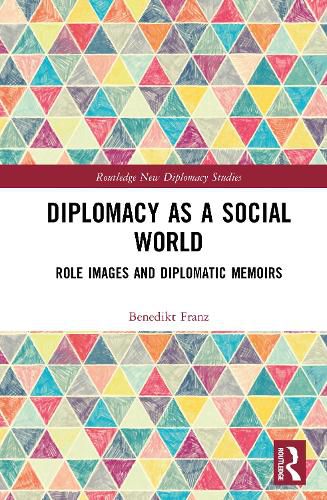Readings Newsletter
Become a Readings Member to make your shopping experience even easier.
Sign in or sign up for free!
You’re not far away from qualifying for FREE standard shipping within Australia
You’ve qualified for FREE standard shipping within Australia
The cart is loading…






This book proposes a reconceptualization of diplomacy as a social world, which has implications for the study of diplomatic memoirs as speech acts and forms of communication in relation to role images of diplomats.
In contrast to the dominant paradigm of Bourdieu-inspired practice theory, which focuses on struggles for position and power, this book proposes to understand diplomacy as a social world. From this vantage point, the intrinsic logic of diplomacy is situated within its own universe of discourse, which has its own manner of communicating and interacting. One element of this universe is role images. The work argues that memoirs by former diplomats serve as a pivotal medium through which diplomatic role models circulating in the wider public sphere are (re)produced. To this end, however, it is necessary to read self-narratives by diplomats not as sources for past events, but as speech acts and communication. The book applies this framework to an empirical analysis of 40 memoirs by former German ambassadors. The result of this analysis is the identification of five diplomatic role models: messenger, traveler, representative, reasonable actor, and relational actor.
This book will be of much interest to students of diplomacy studies, foreign policy, social theory, and International Relations in general.
$9.00 standard shipping within Australia
FREE standard shipping within Australia for orders over $100.00
Express & International shipping calculated at checkout
This book proposes a reconceptualization of diplomacy as a social world, which has implications for the study of diplomatic memoirs as speech acts and forms of communication in relation to role images of diplomats.
In contrast to the dominant paradigm of Bourdieu-inspired practice theory, which focuses on struggles for position and power, this book proposes to understand diplomacy as a social world. From this vantage point, the intrinsic logic of diplomacy is situated within its own universe of discourse, which has its own manner of communicating and interacting. One element of this universe is role images. The work argues that memoirs by former diplomats serve as a pivotal medium through which diplomatic role models circulating in the wider public sphere are (re)produced. To this end, however, it is necessary to read self-narratives by diplomats not as sources for past events, but as speech acts and communication. The book applies this framework to an empirical analysis of 40 memoirs by former German ambassadors. The result of this analysis is the identification of five diplomatic role models: messenger, traveler, representative, reasonable actor, and relational actor.
This book will be of much interest to students of diplomacy studies, foreign policy, social theory, and International Relations in general.